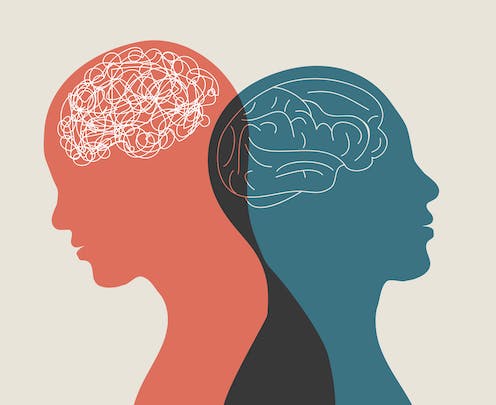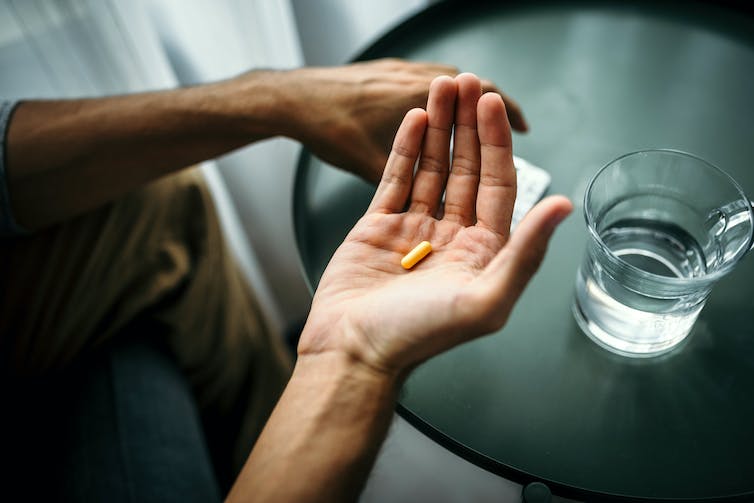
There is mounting recognition in the scientific community that combining different treatment approaches for mental health conditions can create a benefit greater than the sum of its parts.
As a clinical psychologist and neuroscience researcher, I have been working to integrate insights from both fields to expand treatment options for those suffering from depression, anxiety and related conditions. Designing a treatment plan that pays careful attention to the sequence and dose of both biological and behavioral therapies might benefit people in new ways that neither approach can achieve on its own.
Anxiety and depression are the most prevalent mental health conditions around the world. Globally, about 280 million people experience depression, and as many as 1 in 3 will meet the diagnostic criteria for an anxiety disorder at some point in their lives. There are numerous effective treatment options for both conditions, including medications, psychotherapy, lifestyle changes and neurostimulation.
Doctors and therapists recommend many patients seeking mental health care try more than one approach simultaneously, such as medication and therapy. This is based on the idea that if they were to respond well to any of the prescribed treatments, they would experience a net benefit more quickly or more strongly than if they were to try each sequentially. However, researchers have historically studied each approach in isolation. Most research has focused on comparing individual treatments one at a time to a control, such as a pill placebo or a psychotherapy waitlist.
Neuroplasticity and treatment
Recent advances in scientific understanding of depression, anxiety and other stress-related conditions suggest that changes and impairments in neuroplasticity are critical contributors.
Neuroplasticity refers to the brain’s capacity to flexibly adjust in response to an ever-changing environment – it’s a critical component of learning. In animal studies, deficits in neuroplasticity are seen as changes to molecular and neural pathways, such as a decreased number of synapses, or points of contact between neurons, following chronic stress. These changes might be related to mental patterns and symptoms of depression and anxiety in people, such as when patients report a reduced capacity to think, feel and act flexibly. They may also be linked to thinking about, remembering and interpreting information in a way that tends to be biased toward the negative.
Research has shown that many effective biological treatments, including medications and neurostimulation, can enhance or alter neuroplasticity. Certain lifestyle changes such as regular exercise can have similar effects. Scientists consider this key to how they reduce symptoms. Unfortunately, symptoms often return when these treatments are discontinued. Relapse is particularly apparent for medications. For both older and newer antidepressant and anti-anxiety medications, relapse rates begin climbing shortly after patients stop treatment.

Vasil Dimitrov/E+ via Getty Images
In contrast, behavioral treatments such as psychotherapy introduce new skills and and habits that may be more long-lasting. Benefits continue even after the most intense phase of treatment ends. Regular meetings with a therapist over the course of several months can help many patients learn to cope with negative symptoms and life circumstances in new ways. But such learning depends on neuroplasticity to forge and retain these new, helpful pathways in the brain.
Researchers hypothesize that enhancing or modulating plasticity with a biological intervention like medication may not only reduce symptoms but may also provide a window of opportunity for behavioral interventions like psychotherapy to be more effective. Learning-based interventions like cognitive-behavioral or exposure therapy, if properly timed, could harness the enhanced neuroplasticity that biological interventions induce and improve long-term outcomes.
Think of pathways in the brain as roads. Biological treatments transform a sparsely connected set of roads – consisting only of a few well-trodden pathways that represent unhelpful thoughts, fears and habits – into a denser network of interconnected, freshly paved roadways. Behavioral treatments can be likened to repeatedly driving over a specific subset of new roads that lead to more balanced perspectives on yourself and the world around you, learning them until you can drive down them effortlessly, no GPS required. This ensures that those now familiar roadways will be readily available to you in the future and protect you against the return of anxiety and depression.
Synergies in combined treatment
Designing combined treatments to explicitly promote synergy is relatively new, and there is increasing evidence supporting it. A few specific examples are noteworthy.
First, some studies have shown that D-cycloserine, an antibiotic used to treat tuberculosis, may make exposure therapy for anxiety conditions more effective by helping patients learn to quell their fears. D-cycloserine may also enhance the antidepressant effects of a type of neurostimulation called transcranial magnetic stimulation, which stimulates nerve cells using magnetic fields.
Several studies suggest that pairing neurostimulation with cognitive-behavioral approaches like cognitive-behavioral therapy or cognitive control training may yield longer-term reductions in depression and anxiety.
Similarly, low doses of ketamine, a drug used in general anesthesia, with rapid antidepressant effects, can be used to “prime the pump” for new, helpful learning. A study my team and I conducted found that daily computer-based exercises of 30 to 40 minutes over four days following a single ketamine dose led to a ninefold increase in the duration of antidepressant effects – 90 days of reduced symptoms – compared with ketamine alone, which led to 10 days of reduced symptoms.
Finally, there is increasing interest in using other medications with psychedelic properties to assist in psychotherapy. The therapeutic benefits of taking these psychedelic-assisted therapies under medical supervision are attributed to the rapid neuroplasticity-enhancing and consciousness-altering effects of drugs like psilocybin and MDMA. Researchers think these short-term effects foster new insights and perspectives that psychotherapists can help patients integrate into their permanent worldview.
There is great potential in neuroscience-guided ways to combine treatments. However, it’s important to note that different treatment approaches can occasionally work against each other, lessening the long-term benefits of psychotherapy alone. For example, one study on panic disorder found that patients who learned psychotherapy techniques while taking anti-anxiety medication had a greater chance of relapse after discontinuing their use compared with those given psychotherapy alone.
Carefully designed clinical trials and long-term follow-ups are needed to fully understand how to combine the biological and the behavioral to develop treatments that are efficient, accessible, safe and enduring.
![]()
Rebecca Price receives funding from the National Institute of Mental Health and the Laurel E. Zaks Memorial Research Fund and is named as the inventor on a University of Pittsburgh-owned patent filing relevant to synergistic bio-behavioral treatments for anxiety and depression.

























